by Naomi L. | July 31, 2013 | Blog, Creative Writing, Notable Authors |
Last month, I started a topic on my blog about sources of inspiration for my writing, which I opened with a couple of posts about Roald Dahl and one of his wonderful novels. Now I’d like to continue on the topic by passing the spotlight onto another author who has greatly inspired me in my writing, and since today is her birthday, I decided this would be the best time to include her in the segment. Featured today among my blog’s Notable Authors is world-famous fantasy author: J.K. Rowling.
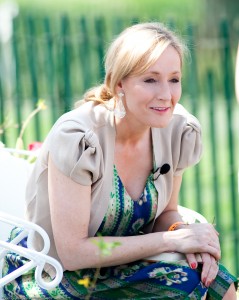
J.K. Rowling in 2010
Bio
Name: Joanne Rowling
Pen Name: J.K. Rowling
Life: Jul. 31, 1965 – present
Gender: female
Nationality: British
Occupation: novelist
Genres: fantasy, tragicomedy, crime fiction
Notable Works: Harry Potter series, The Casual Vacancy, The Cuckoo’s Calling (under the pseudonym Robert Galbraith)
My Favorite Works: All the Harry Potter books, but especially Harry Potter and the Deathly Hallows (Book 7)
Inspiration
J.K. Rowling is a world-renowned British novelist, best known for her highly acclaimed Harry Potter series. I was first introduced to her work in my childhood, when my best friend at the time gave me the first two books in the series as a birthday present, and it took me less than a chapter to be hooked for life. The author created such a vivid and imaginative world in Harry Potter and the Sorcerer’s Stone (or Philosopher’s Stone in its original UK title) that I remained loyal to the series for the rest of my childhood and my entire adolescence, reading every new book as it came out until finally closing the back cover on the epilogue. Like so many young readers of my generation, I had been captivated by the magic of Rowling’s imagination.
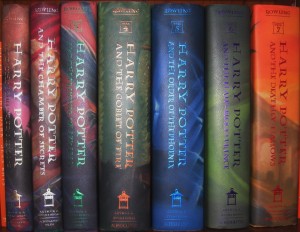
Harry Potter, Books 1-7
Though she’s established herself as a versatile writer, it’s likely Ms. Rowling will always be known first and foremost as a fantasy author, and it’s as such that she’s inspired me in my own writing. The Harry Potter books not only brought me countless hours of entertainment growing up, but they also taught me a lot about the incredible amount of detail that goes into constructing a fantasy world, something I hope to be able to accomplish myself someday. But it wasn’t just her settings that fascinated me; the author also had a gift for constructing characters that I found engaging and relatable. It was interesting that she seemed to know exactly how to write a coming-of-age story for a male protagonist and make his character believable from the innocent age of 11 to the maturity of age 17 and beyond. On top of that, her attention to detail didn’t stop at Harry, for the rest of her characters were just as well-developed, especially the major ones present throughout all or most of the series. With so much work and care put into creating the world of Harry Potter, it’s really no mystery why I was only one among millions of readers worldwide who were touched by Rowling’s amazing stories.
Now I know that this famous children’s series and its supplements aren’t her only works, but because these are the only books of Ms. Rowling’s that I’ve read (so far), I can’t give a subjective review of The Casual Vacancy or The Cuckoo’s Calling yet. However, I can express my admiration for the author’s ability to step outside the fantasy “brand” she established for herself and still manage to create stories that are generally well-received by her audience. What truly amazed me was hearing the recent news about the latter novel, which she secretly published under the pseudonym Robert Galbraith in an attempt to evade the pressure that comes with being one of the most famous writers in the world. Sure, it didn’t become a bestseller until after its author’s true identity was revealed, but early reviews were still mostly favorable considering it was believed to have been written by a debut writer. If nothing else, it’s inspiring to see how Rowling continues to pursue writing in the face of all the hype around her and keep on creating the stories she wants to tell the world.
J.K. Rowling has been an inspiration to me for her wonderful fantasy writing and the joy her novels have brought me for most of my life. Being an aspiring fantasy author myself, her stories have served as great motivation for me to create my own magical worlds with the same level of care and detail that she put into Harry Potter. While I admire Roald Dahl as the author who first inspired me to become a writer, I will always revere J.K. Rowling as the gifted storyteller who kept me on that path for life.
Happy Birthday, Ms. Rowling! And congratulations on all your amazing achievements! From the bottom of this young dreamer’s heart, thank you.
by Naomi L. | June 12, 2013 | Blog, Creative Writing, Notable Authors |
So last week, I talked about a book that I loved as a child: Charlie and the Chocolate Factory. Continuing on the subject of inspiration, I wanted to create another subtopic focusing on authors whose work has inspired me in my own writing, and it seems only fair to start with the same author of the wonderful book I’ve already reviewed. Kicking off the Notable Authors segment of my blog is storyteller extraordinaire and one of my favorite writers of all time: Roald Dahl.
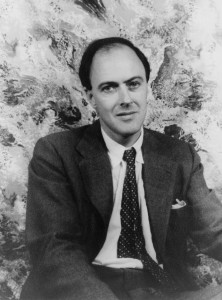
Roald Dahl in 1954
Bio
Name: Roald Dahl
Pen Name: Roald Dahl
Life: Sept. 13, 1916 – Nov. 23, 1990
Gender: male
Nationality: British (born in Wales), Norwegian descent
Occupation: novelist, short story writer, screenwriter, fighter pilot (WWII)
Genres: children’s literature, fantasy, mystery, nonfiction
Notable Works: Charlie and the Chocolate Factory, Fantastic Mr. Fox, James and the Giant Peach, Matilda
My Favorite Works: Charlie and the Chocolate Factory, Matilda, The Umbrella Man and Other Stories
Inspiration
Roald Dahl was my favorite author growing up, and with good reason. Having captivated me at the age of nine with his 1964 novel Charlie and the Chocolate Factory, he quickly drew me into his fantastic world with more children’s books like Matilda, Fantastic Mr. Fox, The Witches and several others. His unique style of storytelling was very entertaining to read, for he always seemed to know exactly how to paint a mental picture from the perspective of a child, which is much more appealing (and less patronizing) than an adult trying to describe the events of a story in a way that children will understand. Reading each of Mr. Dahl’s novels as a kid, I felt as though I were being told a story by someone who understood exactly how I saw the world, and who knew exactly what I wanted to find in the pages of a book. It may seem odd, but whenever I was reading one of his stories, I didn’t see him as just an author; I saw him almost as a friend.
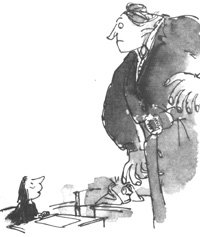
Matilda and Miss Trunchbull, Matilda
(Illustration by Quentin Blake)
Something I always loved about Dahl’s children’s books was the fact that his heroes were usually children. Charlie Bucket, Matilda Wormwood, the unnamed protagonist of The Witches (named Luke Eveshim in the 1990 film), among others, all live incredible adventures before even having reached adolescence. For the preteen me, it was wonderful to read about heroes who were my age; it made me feel like it could just as easily have been me taking a tour through a magical chocolate factory, or developing telekinetic powers, or executing brilliant plans to defeat witches or cruel headmistresses or nasty adults of any sort. That’s another interesting detail about the author’s stories: just as the heroes are often children, the villains are often adults. And honestly, could anything be more relatable to a young reader?
But Mr. Dahl’s brilliant storytelling skills were not limited to children’s fiction. He wrote a fair amount of excellent short stories for older audiences; one such compilation – The Umbrella Man and Other Stories – contains some of the most delightfully creative short pieces I’ve ever read in a book. His autobiography, Boy: Tales of Childhood, includes hilarious accounts of events that I could hardly believe were true stories (my personal favorite is the Great Mouse Plot of 1924, which romantic comedy fans may remember as the story Meg Ryan reads to the children in the bookstore in the 1998 film You’ve Got Mail), but which certainly explain the colorful stories he would go on to write later in his life. With numerous awards and tremendous merit to his name, it’s clear that Dahl was talented at entertaining readers of all ages alike.
Roald Dahl is one of my heroes. He introduced me to a magical world that I could visit anytime I wanted to escape from reality, and he was the first author ever to inspire me to pursue creative writing. His stories have touched me and will remain forever embedded in my heart, and for that, I will always admire him as one of the greatest storytellers whose work I’ve had the pleasure of reading. Thank you, Mr. Dahl, for your wonderful gift! You will never be forgotten.
by Naomi L. | June 5, 2013 | Blog, Creative Writing, Off The Bookshelf |
So I wanted to start a section of my blog focusing on sources of inspiration, that is, what inspires me as a writer and what I hope can inspire others as artists. The first idea that came to mind was a subtopic for the books I’ve read that have motivated me in my writing, sort of like a virtual bookshelf. Then I thought, what better book to start off with than the one that first inspired me to become a writer? So here is a brief review of one of my favorite books as a child: Charlie and the Chocolate Factory by Roald Dahl.
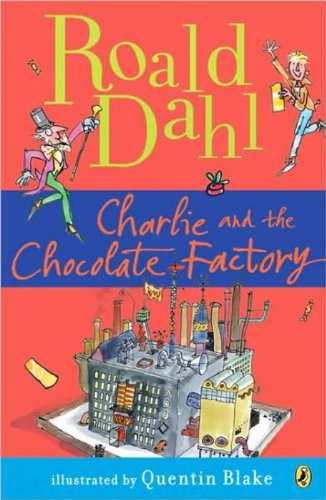
Charlie and the Chocolate Factory, by Roald Dahl
Summary
In case you haven’t yet read the book (first published in 1964) or seen either of the movie adaptations (released in 1971 and 2005), Charlie and the Chocolate Factory tells the story of Charlie Bucket, a kind and honest young boy of very humble origins who has always been intrigued by the mysterious chocolate factory located near his home, run by the legendary Willy Wonka. One day, Charlie’s wildest dreams come true when he becomes one of only five lucky children around the world to find a golden ticket inside a Wonka’s chocolate bar, constituting an invitation from the famous chocolatier himself to visit his factory for an entire day. Fantastical adventures ensue as Charlie and the others follow Mr. Wonka on a magical tour through the strange facility, at the end of which lies a special grand prize for only one very lucky child. How will things fare for our hero and the four terrible brats as they discover the wonders of Wonka’s chocolate factory? It’s the greatest adventure of young Charlie’s life, and he can’t wait to find out!
Review
I first read this book when I was nine years old, at the recommendation of my mother. Though I was no stranger to reading, it was the first book I ever read that was written by Roald Dahl, and consequently, it became the reason he was my favorite author growing up. Charlie and the Chocolate Factory fulfilled a great wish I had throughout my entire childhood: to escape into a magical world far from the realm of reality.
As I read the story, I lived vicariously through the character of Charlie Bucket, who had the amazing opportunity to step out of his ordinary life and spend a day in a land of fantasy. Today, I look at him as an excellent role model for young children: humble, honest and with a vivid imagination. Willy Wonka is a wonderfully eccentric character, likely intended as a personification of the dreamer mentality lost on many of the “normal” adults in the author’s stories; and the four children joining Charlie on his adventure have such ridiculously bratty personalities that it can only make for some hilarious scenarios during the course of the factory tour.
But it wasn’t just the story that I loved; it was the way it was told. Mr. Dahl always had a very creative style of narrating his children’s books that appealed as much to his young target audience as to the metaphorical child in each of his older readers, and Charlie and the Chocolate Factory is no exception. Every time one of the bratty golden ticket winners gets into trouble, the situation is resolved in a unique and comical way as could only come from a mind as imaginative as Dahl’s. The songs sung by the factory’s Oompa Loompa workers are not only funny, but actually teach valuable lessons, though it’s safe to assume the advantages of reading over watching television and the prominent role that parents play in raising spoiled children are already common knowledge. Even the various candies and chocolate delights described throughout the story sound so delicious and inventive, you wish you could reach into the pages and try some for yourself (except maybe the chewing gum).
Inspiration
Though I was already a longtime fan of fiction, this was the first book to make me want to write stories of my own. The joy I felt when escaping into Charlie’s world inspired me to follow Mr. Dahl’s lead and create magical adventures for others to enjoy, and for that, I will always admire him as one of my all-time favorite authors. With its wild twists, eccentric characters and endless supply of phizz-whizzing fun, Charlie and the Chocolate Factory is a great read for the imaginative child in any reader, and especially for the dreamer in every fiction writer. One could expect nothing less from the world’s most scrumdiddlyumptious storyteller!







Recent Comments